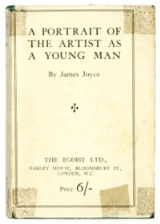
, first serialised in the magazine The Egoist
from 1914 to 1915, and published first in book format in 1916
by B. W. Huebsch
, New York. The first English edition was published by the Egoist Press in February 1917. The story describes the formative years of the life of Stephen Dedalus
, a fictional alter ego
of Joyce and an allusion
to the consummate craftsman of Greek mythology
, Daedalus
.
A novel written in Joyce's characteristic free indirect speech
style, A Portrait is a major example of the Künstlerroman
(an artist's Bildungsroman
) in English literature.
— And thanks be to God, Johnny, said Mr Dedalus, that we lived so long and did so little harm.— But did so much good, Simon, said the little old man gravely. Thanks be to God we lived so long and did so much good.![]()
To merge his life in the common tide of other lives was harder for him than any fasting or prayer, and it was his constant failure to do this to his own satisfaction which caused in his soul at last a sensation of spiritual dryness together with a growth of doubts and scruples.![]()
Her image had passed into his soul for ever and no word had broken the holy silence of his ecstasy. Her eyes had called him and his soul had leaped at the call. To live, to err, to fall, to triumph, to recreate life out of life! A wild angel had appeared to him, the angel of mortal youth and beauty, an envoy from the fair courts of life, to throw open before him in an instant of ecstasy the gates of all the ways of error and glory. On and on and on and on!![]()
It wounded him to think that he would never be but a shy guest at the feast of the world's culture.![]()
When the soul of a man is born in this country there are nets flung at it to hold it back from flight. You talk to me of nationality, language, religion. I shall try to fly by those nets.![]()
Ireland is the old sow that eats her farrow.![]()
Pity is the feeling which arrests the mind in the presence of whatsoever is grave and constant in human sufferings and unites it with the sufferer. Terror is the feeling which arrests the mind in the presence of whatsoever is grave and constant in human sufferings and unites it with the secret cause.![]()
The artist, like the God of the creation, remains within or behind or beyond or above his handiwork, invisible, refined out of existence, indifferent, paring his fingernails.![]()
His mind, emptied of theory and courage, lapsed back into a listless peace.![]()

